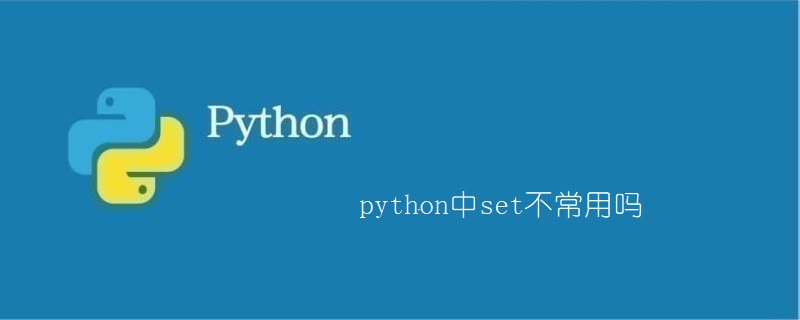Home >Backend Development >Python Tutorial >Is set not commonly used in python?
Is set not commonly used in python?
- anonymityOriginal
- 2019-06-12 16:39:412592browse
Set is similar to dict. It is also a collection of keys, but does not store value. Since keys cannot be repeated, there are no repeated keys in the set. The set() function creates an unordered set of non-repeating elements, which can be used to test relationships, delete duplicate data, and calculate intersections and differences. , union, etc.
 set Syntax:
set Syntax:
class set([iterable])
Parameter description: iterable -- iterable object object;
set collection is an unordered and A set of non-repeating elements #set is an unordered and non-repeating set of elements
s1=set()
s1.add("alex")
s1.add("eric")
print(s1)
#访问速度快
#天生解决了重复问题
ll=[1,2,3,4,5,6,3,2,1]
s2=set(ll)
print("转换后的集合为:",s2)
#去除相同项,生成一个新的集合,删除
s3=s2.difference([1,2,3,11])
print("s2不变:",s2)
print("观察是否生成一个新的集合s3:",s3)
s4=s2.difference_update([3,4,5,11]) #删除所有包含在新集合中的元素,并生成一个新的集合
print("是否改变原集合s2:",s2)
print("是否生成新集合s4:",s4)
ret=s2.pop() #取出元素,并赋值给ret
print("移除s2中的一个元素",s2)
print("测试pop是否有返回值,移除的元素是:",ret)
ret1=s2.remove(2) #必须带参数且没有返回值
print("移除s2中的一个元素:",s2)
print("测试remove是否有返回值:",ret1)
#练习
# 数据库中原有
old_dict = {
"#1":{ 'hostname':"c1", 'cpu_count': 2, 'mem_capicity': 80 },
"#2":{ 'hostname':"c1", 'cpu_count': 2, 'mem_capicity': 80 },
"#3":{ 'hostname':"c1", 'cpu_count': 2, 'mem_capicity': 80 }
}
# cmdb 新汇报的数据
new_dict = {
"#1":{ 'hostname':"c2", 'cpu_count': 2, 'mem_capicity': 800 },
"#3":{ 'hostname':"c2", 'cpu_count': 2, 'mem_capicity': 80 },
"#4":{ 'hostname':"c2", 'cpu_count': 2, 'mem_capicity': 80 }
}
"""
分析:
1、新有,原来无→新加入
2、新有,原来有→更新
3、新无,原来有→原来删除
使用set的交集和差集来计算
old_dict.keys()
new_dict.keys()
交集(更新):要更新的数据
差集(删除):old_dict.keys()--交集
差集(添加):new_dict.keys()--交集
"""
old=set(old_dict.keys())
new=set(new_dict.keys())
up_set=old.intersection(new) #需要更新的集合
del_set=old.symmetric_difference(up_set) #需要删除的集合
add_set=new.symmetric_difference(up_set) #需要添加的集合The above is the detailed content of Is set not commonly used in python?. For more information, please follow other related articles on the PHP Chinese website!

